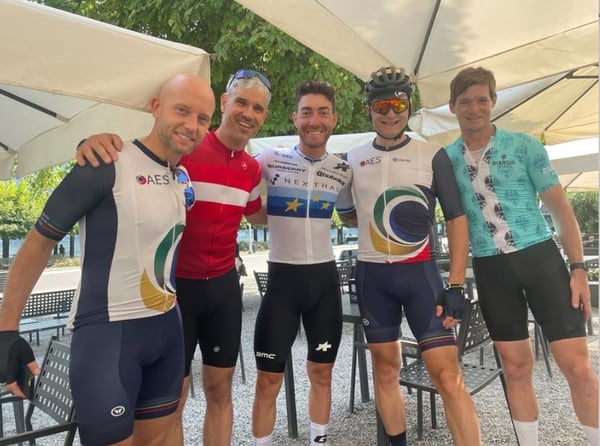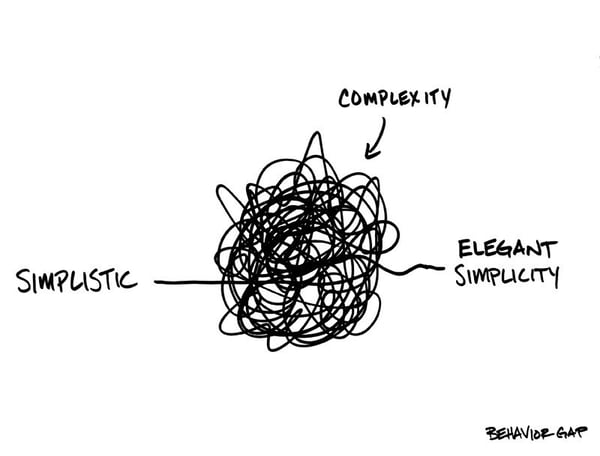I’m back from cycling in Italy.
5 days and 5 classic rides through challenging and beautiful terrain.
I’m refreshed and recharged to tackle the rest of the year.
But what other insights did I learn?
One of the highlights was meeting the European and Italian Road Champion, Giacomo Nizollo (the one in the middle with the very big legs!).
With over 60 major racing results I am fascinated by what drove his success.

Seth Godin, author, entrepreneur and agent of change, said in a blog titled The Top 5%:
"In every field, extraordinary benefits go to those seen as being in the top five percent. One out of 20. Sure, the biggest prizes go to the once-in-a-generation superstar. But that’s largely out of reach. It turns out, though, that if you’re thoughtful and diligent, the top 5% is attainable.”
Here are some of the ideas on what’s required to be in the top 5%:
1. Find your why
For many this isn’t about money but simply find what you’re capable of.
What impact can the best version of yourself actually make in the world and how do you realise your potential?
2. Find your niche
What’s the right set for you to be the top 5% of?
Top 5% of your local village, top 5% of those in your company, your profession or (like Giacomo) the top 5% of the world’s professional cyclists.
What is your community and where do you set your expectations?
3. Aim for excellence
Excellence is the ability to execute on your life plan, filtering out the crazy ideas and distractions from your true mission, and making sure the golden ideas get slowly and surely built on strong foundations.
Rituals, defined as consistent behaviours, intentional practices and precise schedules no doubt underpin Giacomo’s success and underpin the success of the top 5% of executives, business founders, company owners, senior professionals from every field as well as happy retirees.
4. Assemble your team
Cycling, like life, is a team sport.
Great athletes all have great support teams.
Life is no different, and my own great coach Mick Todd at 2B limitless often says ‘95% of the viscosity of your success is down to your sense of belonging and the community with which you interact.’
5. Never stop learning
Not only do great athletes never stop learning, but they’re also proactive about learning.
They stay humble and try to retain a beginner’s mind.
Although they may recognise and feel proud of how far they’ve come, or enjoy their mastery over aspects of their sport, they never feel like they’ve arrived.
They know that allowing those thoughts leads to hubris; the pride that comes before the fall. For those readers who are leaders in business; here’s an interesting HBR article titled ‘How Humble Leadership Really Works’.
It was a pleasure to be featured on The National Newspaper’s latest podcast.
It was around how to break the fear of investing.
While many choose to invest their money to grow their net worth over time, others prefer to sit in cash which risks the erosion of its value by inflation.
So what causes some people to fear the world of investing? And what can they do to break that fear?
More in the podcast.
I loved the takeaways in Ben Carlson’s latest piece.
“Don’t chase yield. Don’t speculate. Don’t invest in something you don’t understand. Don’t invest in something with no intrinsic value. Don’t expect to get rich quickly.”
Words worth their weight in gold.
The article includes a video clip which is full of great nuggets.
Onto time…
In the hunter-gatherer phase of humanity, we exchanged our time for food.
We spent hours, sometimes days, hunting or gathering food to survive.
When the agricultural revolution started around 10,000 BC, we used the land to harvest crops, domesticate animals, and develop food right where we lived.
We rarely spend time acquiring food now.
Instead, we use our time to acquire money, which we exchange for food.
But here’s the thing.
Some people exchange almost ALL their time for money.
Darius Foroux’s piece talks about buying back your time.
Here are a few of his tips:
- Spend your money mindfully
- Increase your earnings potential
- Invest in assets
Some people find it difficult to balance the pursuit of wealth with the pursuit of inner peace…
Time to learn to do both.
On a similar topic, this article in Humble Dollar talks about choices and trade offs.
When you choose to do one thing with your time and money, you’re also choosing not to do countless other things.
The purchases made and the possibilities forgone sometimes turn into lasting regrets.
Sometimes, people not only misjudge what they want today but also the wants of their future self.
If you find decision-making a complex process – it’s meant to be.
It’s supposed to be confusing, according to Carl Richards.
He says that after you’ve done the research, after you’ve done the homework, after you’ve considered the various options and hopefully documented these into a plan… go quiet.
Meditate, go for a walk, run or cycle…
Then work things through in your head.
Questions for you:
How much time is left in your day for mindfulness and quiet time?
Meditations:
“People do not decide their futures, they decide their habits and their habits decide their future!”
- Gary Keller
“May your choices reflect your hopes, not your fears.”
- Nelson Mandela
“Take time to be quiet.”
- Zig Ziglar
European and Italian Road Champion 'Giacomo Nizollo'
Seth Godin's 'The Top 5%'
HBR article titled ‘How Humble Leadership Really Works’
The National's latest podcast 'How to break the fear of investing'
Ben Carlson's latest piece 'How The Big Short Turned Into The Big Long'
Darius Foroux’s piece 'Money Is Time—Not the Other Way Around'
Humble Dollar's 'Trade offs'
Carl Richards' 'The complex middle between “simplicity” and “elegant simplicity”'

